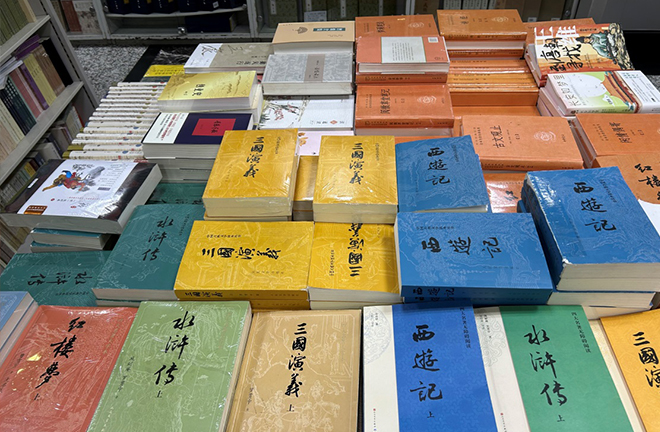How is ‘Black Myth: Wukong’ going viral

A display of Journey to the West and other classic Chinese novels Photo: Yang Lanlan/CSST
Recently, China’s first homegrown AAA game “Black Myth: Wukong” has created a phenomenal buzz worldwide. Not only has it dominated the gaming market, but it has also transcended its niche, sparking a strong interest and fascination among foreign players and internet users for Journey to the West and other Chinese mythological tales.
Outstanding performance
When the game was officially launched on August 20, it quickly attracted over 1 million concurrent players. Just a few days later, that number surged to 3 million, breaking the all-time online concurrent player record on the Steam platform. According to the official account, as of 9 PM Beijing time on Aug. 23, the game had sold over 10 million copies. Based on official pricing, revenue had already surpassed 2.5 billion yuan. Numerous domestic and international data analysis agencies predict that first-month sales could reach 20 million copies, with total sales for the year potentially hitting 30 to 40 million. Along with this rapid increase in sales, Black Myth: Wukong has also earned widespread acclaim, boasting a 96% approval rating on Steam, achieving both critical and commercial success.
Black Myth: Wukong has not only performed exceptionally well in the domestic market but has also achieved impressive success overseas. International sales accounted for 20% of the total, with over 2 million copies sold. As early as a year ago, the game won the Best Visual Effects award at Gamescom in Germany, earning widespread recognition from international gaming media and companies alike. Since its official release this year, reviews from overseas streamers have been overwhelmingly positive. Many well-known international gaming streamers believe that Black Myth: Wukong has a strong chance of winning Game of the Year.
AAA games, which are characterized by substantial investments of money, time, and resources, are regarded as the gold standard in the global gaming industry in terms of production technology, product quality, market influence, and many other indicators. The reason why Black Myth: Wukong has aroused such a strong sense of national pride in China is that it has successfully broken into the upper echelon of the gaming industry—an area long dominated by countries like the United States, Japan, and France—marking China’s entry into the ranks of internationally recognized top-tier games.
Fascinating Chinese culture
As a gaming product, Black Myth: Wukong has triggered a wave of Chinese culture fever abroad. In the view of Chen Hongyu, a research fellow from the Beijing Academy of Social Sciences, the game’s success is not only due to its exceptional quality but also the result of a combination of social, economic, technological, commercial, and cultural factors. The game’s distinctive subject matter sets it apart from the common themes in domestic games, such as martial arts, science fiction, fantasy, or romance, offering a level of novelty that far surpasses these conventional genres. Its stunning visuals, captivating storyline, and the dazzling abilities and moves of characters like Wukong have left players in awe.
Chen also pointed out that Black Myth: Wukong deeply integrates Chinese cultural elements, conveying the traditions and sentiments of the Chinese nation. This not only fulfills players’ psychological needs for cultural identity but also caters to the global curiosity and fascination with Chinese culture. Journey to the West and Sun Wukong [also known as Monkey King], as representative symbols of Chinese culture, bring new audio-visual experiences to players in innovative forms. The unique charm of Oriental culture, as embodied in these stories, holds great appeal to overseas players.
Along with the immense popularity of Black Myth: Wukong, a piece of music within the game that blends sanxian (a three-stringed instrument) with traditional northern Shaanxi storytelling has also garnered widespread acclaim. As a traditional regional art form in decline, northern Shaanxi storytelling has found new life through its collaboration with Black Myth: Wukong. Its passionate and dynamic style has been introduced to a broader audience, even gaining the recognition and admiration of foreign players unfamiliar with the Chinese language.
Zong Zupan, a distinguished research fellow from the Institute for Cultural Industries at Shenzhen University, asserted that Black Myth: Wukong demonstrates the unique charm of China’s fine traditional culture and opens up a new avenue for cultural export. For the first time, the Journey to the West story has been presented in the form of an AAA game. The game’s incorporation of Oriental aesthetics and rich Chinese mythology not only resonates with domestic players’ cultural sentiments but also inspires global players to explore and learn more about Chinese culture. This provides a distinctly “Chinese-style” experience, which sets it apart from the traditional styles of European, American, and Japanese games. The success of Black Myth: Wukong is inseparable from its profound and unique cultural connotations.
Zong added that works granted “classic” status are those containing meaningful beauty, eternal sentiment, and grand spirit. Since the 1986 TV adaptation of Journey to the West, cultural creations based on this story have achieved remarkable success across various fields, even setting industry standards. Within the vast treasure trove of Chinese culture, there is a wealth of such resources waiting to be discovered by those with a keen eye.
Edited by YANG LANLAN

 PRINT
PRINT CLOSE
CLOSE